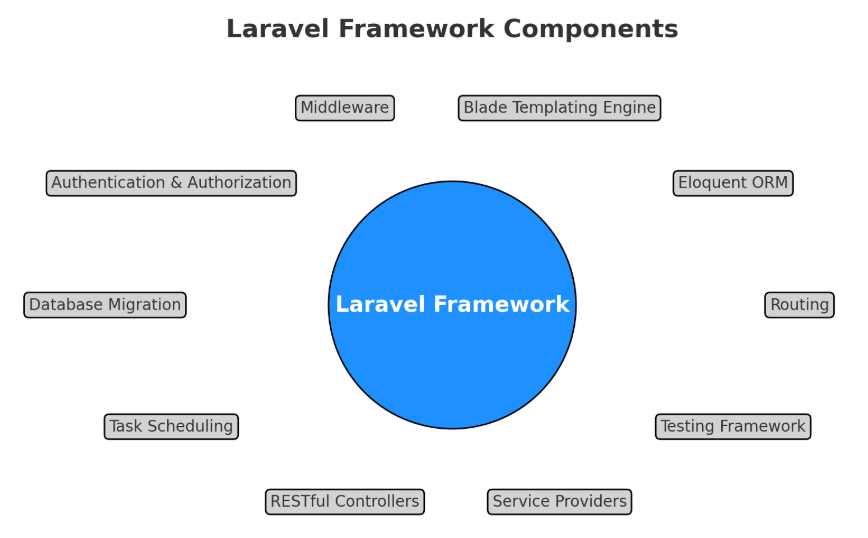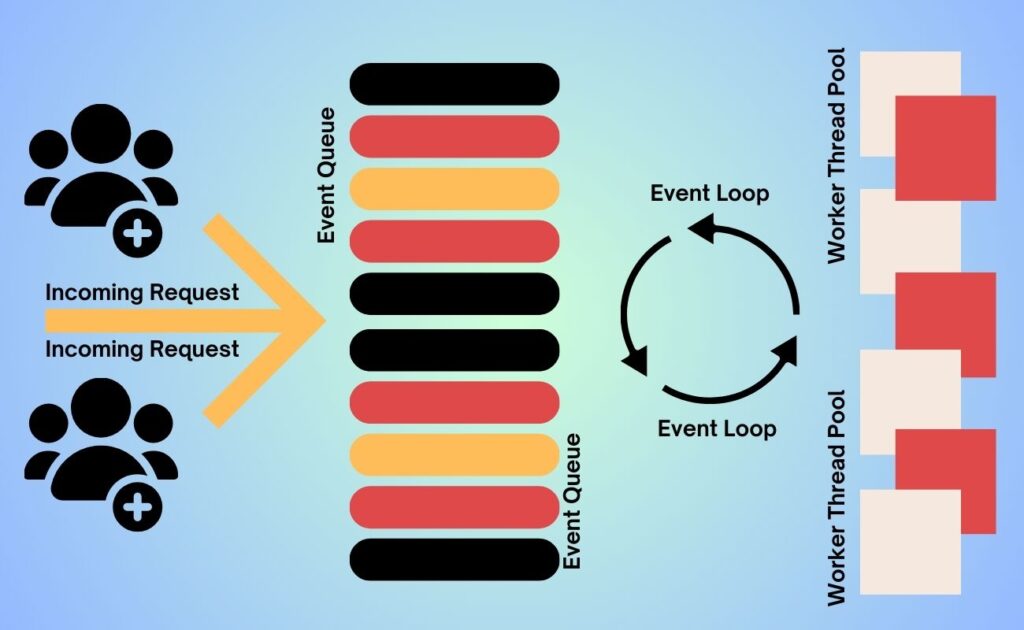Laravel vs Node.js, Which is Better and Why?
Deciding on the best web development framework can feel like picking between a Tesla and a Lamborghini, both powerful, but suited for different needs. In 2024, the tech race narrows down to Laravel vs Node.js, two titans of modern web development. Laravel, favored for PHP-based web development, is celebrated for its syntax and tools that simplify complex projects.
Meanwhile, Node.js web development shines with its event-driven architecture, making it a top choice for real-time applications. Did you know Node.js powers more than 6.3 million websites globally, while Laravel supports major brands like Disney and Twitch? Let’s explore which framework meets your project’s needs.
MARSMATICS WILL HELP YOU IN YOUR Wedsbite DEVELOPMENT NEEDS
What is Laravel?
Laravel is an open-source PHP framework that simplifies the process of building robust and scalable web applications. It is widely regarded as a go-to solution for modern PHP web development frameworks due to its intuitive tools and well-organized syntax. Laravel provides built-in features like routing, authentication, and database migrations, which significantly reduce development time and effort.
For example, in an e-commerce project, Laravel’s Eloquent ORM helps manage product databases effortlessly, while its Blade templating engine ensures dynamic and visually appealing user interfaces. These capabilities make Laravel web development an excellent choice for crafting feature-rich applications. Whether you’re working on a startup idea or scaling a business platform, this PHP web development framework streamlines tasks and enhances productivity, making it highly popular among developers globally.

Laravel Main Features:
Laravel is a versatile PHP web development framework, packed with features that simplify the development process for modern applications. Below is a table highlighting key Laravel programming features, their benefits, and their role in full-stack development and Laravel web development.
| Feature | Description | Benefit |
| Eloquent ORM | An object-relational mapper for database interaction, using an intuitive and simple syntax. | Simplifies database management and complex queries. |
| Blade Templating | A lightweight templating engine for designing dynamic layouts. | It enhances frontend integration in full-stack development. |
| Routing System | Manages application routes effectively, supporting RESTful services. | Streamlines the organization of web application logic. |
| Authentication Tools | Pre-built functionality for secure user authentication and authorization. | Saves time and ensures robust security. |
| Task Scheduling | A scheduling system integrated with cron for managing repetitive tasks. | Automates background processes efficiently. |
| Middleware | Provides a layer to filter HTTP requests entering an application. | Enhances control and flexibility in handling requests. |
| Built-in Testing Tools | Tools like PHPUnit for testing features and debugging. | It ensures stability and performance of applications. |
Laravel’s features empower developers to craft scalable and efficient web applications, making it a top choice in Laravel web development projects. These capabilities ensure streamlined workflows in both full-stack development and backend-focused implementations.
Laravel Use Cases:
Here’s how Laravel web development can be applied across various industries, thanks to its flexibility as an open-source PHP framework. The following table highlights some of the key use cases and how Laravel fits into them:
| Use Case | Description | Benefits |
| E-Commerce Platforms | Laravel is perfect for building secure, scalable online stores with features like product management, user authentication, and payment integration. | Simplifies complex e-commerce workflows and security. |
| Content Management Systems (CMS) | Laravel offers flexibility, developers can create custom CMS platforms that manage and display dynamic content efficiently. | Tailored solutions with easy-to-use admin panels. |
| On-Demand Service Platforms | This web development framework is deal for building apps like ride-sharing or food delivery services that require real-time data and task scheduling. | Real-time features and automated background tasks. |
| Enterprise Web Applications | Laravel’s scalability and security features make it a top choice for large-scale business applications that need seamless data management and integration. | Handles complex workflows and large datasets securely. |
As one of the best backend frameworks, Laravel shines in all these use cases by providing developers with powerful tools to build scalable, feature-rich applications.
TOP 10 DATABASE FOR WEB APPLICATIONS
Who Uses Laravel?
- Small to Medium Businesses (SMBs
- Startups
- Enterprise Companies
- Freelancers & Developers
- Mid to Large Size Agencies
What is Node.js?
Node.js is an open-source, cross-platform runtime environment that allows developers to run JavaScript on the server side. Unlike traditional PHP-based web development, where PHP handles server-side scripting, Node.js web development enables JavaScript to manage both client and server-side tasks. This unification of languages simplifies development and improves efficiency.
A great example of Node.js web development is building a real-time chat application. Node.js’s non-blocking, event-driven architecture ensures fast message delivery even with thousands of concurrent users. Tools like Socket.io are often used with Node.js to create seamless communication channels.
Node.js has become increasingly popular in the web development world. It is used by large-scale applications such as Netflix, which handles more than 1 billion hours of content streamed per month with the help of Node.js. Additionally, LinkedIn switched from a traditional PHP web development framework to Node.js, improving its mobile app performance by 20 times.
In 2024, Node.js continues to be one of the top choices for developers looking to create fast, scalable applications, particularly for real-time communication apps, streaming services, and microservices. It’s especially favored for its performance, scalability, and vibrant ecosystem.

Node.js Main Features:
Below is a table summarizing the main features of Node.js and how they contribute to its popularity in Node.js web development:
| Feature | Description | Benefits |
| Non-Blocking I/O | Node.js uses asynchronous, non-blocking I/O, allowing it to handle multiple requests simultaneously. | It improves performance, especially for real-time applications. |
| Event-Driven Architecture | It uses an event-driven architecture where the server waits for and responds to events. | Efficient handling of concurrent requests with minimal resources. |
| Single-Threaded Model | Node.js runs on a single thread using event loops to handle multiple connections. | Allows for efficient memory usage and low overhead. |
| Cross-Platform | Node.js can run on various platforms like Windows, Linux, and macOS, making it flexible and adaptable. | Great for building applications that need to run across different operating systems. |
| Vibrant Ecosystem | Node.js has a rich ecosystem of libraries and modules, available via the Node Package Manager (NPM). | Reduces development time by allowing easy access to pre-built modules. |
| Real-Time Application Support | Ideal for applications like chat apps or live data feeds that need real-time communication. | Excellent for Node.js web development in real-time apps. |
| Scalability | Node.js is designed for high scalability, handling a large number of simultaneous connections. | Makes it a preferred choice for building scalable, large-scale applications. |
Node.js web development offers a range of features that make it a strong competitor against traditional PHP web development frameworks. Its asynchronous, event-driven nature makes it particularly suited for applications that require high concurrency and real-time capabilities.
Node.js Use Cases:
Node.js has become a go-to choice for developers across various industries due to its high performance, scalability, and flexibility. Here are some of the most common and unique use cases where Node.js web development stands out:
| Use Case | Description | Why Node.js Works Best |
| Real-Time Applications | Apps like chat systems, messaging platforms, and live notifications. | Node.js is designed to handle real-time data efficiently with its event-driven, non-blocking I/O model. |
| E-Commerce Platforms | Building online stores, order management systems, and payment gateways. | Node.js is lightweight and fast, making it perfect for handling high traffic and scaling with ease. |
| Streaming Services | Video streaming, media platforms, and live broadcasting apps. | Node.js handles high concurrent connections with low latency, making it ideal for streaming. |
| Single-Page Applications (SPA) | Dynamic web applications that load a single HTML page and update content without reloading the page. | Node.js provides fast, non-blocking data handling that is crucial for smooth SPAs. |
| API Development | RESTful APIs for mobile apps, third-party integrations, and microservices. | Node.js is great for building APIs due to its ability to handle a high volume of simultaneous requests. |
Node.js web development helps businesses can build efficient and scalable applications. Unlike an open-source PHP framework, which excels in different use cases, Node.js is regarded as one of the best backend frameworks for handling real-time interactions, large-scale apps, and API-driven services.
Blazor vs Angular in Web Development: Pros, Cons, and Key Differences
Who Uses Node.js ?
- Real-Time Applications (e.g., Slack, Trello).
- E-Commerce Platforms (e.g., eBay, Shopify).
- API Development (e.g., Uber, Netflix).
- Streaming Services (e.g., Spotify, YouTube).
- IoT Applications (e.g., Nest).
- Microservices Architecture (e.g., PayPal).
Side by side comparison | Laravel vs. Node.js
| Feature | Laravel | Node.js |
| Ease of Use | ✅ | ❌ |
| Real-Time Application Support | ❌ | ✅ |
| Event-Driven Architecture | ❌ | ✅ |
| Non-Blocking I/O | ❌ | ✅ |
| Built-in Authentication | ✅ | ❌ |
| Database Integration | ✅ | ❌ |
| Performance for Real-Time Apps | ❌ | ✅ |
| Great for API Development | ✅ | ✅ |
| Scalability | ✅ | ✅ |
| Large Ecosystem of Libraries | ✅ | ✅ |
| Cross-Platform Support | ❌ | ✅ |
| Active Community Support | ✅ | ✅ |
| Supports Full-Stack Development | ✅ | ✅ |
| Faster Development Time | ✅ | ❌ |
Which platform is better and why?
When comparing Laravel vs Node.js, the choice depends on the project requirements. If you’re working on a traditional web application that requires a powerful, feature-rich backend, Laravel is the ideal choice. As a PHP web development framework, it provides a fast development process with built-in tools for authentication, database management, and more.
However, if you need to build a real-time application or require better scalability for handling high concurrent requests, Node.js excels. It’s one of the best web development frameworks for real-time apps and API-driven projects, thanks to its non-blocking architecture and performance.
Ultimately, for full-stack, traditional web apps, Laravel (an open-source PHP framework) is great, but for modern, scalable solutions, Node.js takes the lead. The choice should be made based on the specific needs of your project.
Conclusion:
To wrap it up, deciding between Laravel vs Node.js depends on what your project needs. Laravel and Node.js both have their strengths: Laravel is great for traditional, feature-rich web applications, while Node.js is ideal for real-time and scalable projects. If you’re looking for quick development with PHP, Laravel is the way to go. But if performance and handling lots of users at once is your goal, Node.js might be the better fit. Both of these web development frameworks are powerful and considered to be the best web development framework for you depending on your project’s requirements.
FAQS
What’s the basic difference between larevel and node.js?
Laravel is a PHP web development framework focused on server-side scripting, offering built-in features, while Node.js is a runtime environment for building scalable, event-driven applications using JavaScript.
Which platform is better for web development projects?
The choice depends on your project needs: Laravel is great for traditional web apps, while Node.js excels in real-time applications and scalable, API-driven projects.
Can laravel and node.js used together?
Yes, Laravel can be used for the backend and Node.js for handling real-time features or microservices, integrating seamlessly through APIs.
Which are the top 3 php frameworks for web development?
The top three PHP frameworks for web development are Laravel, Symfony, and CodeIgniter, offering robust tools and features for developers.








